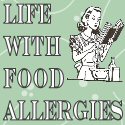Our family physician was the first (2 1/2 years ago) to suggest that we try to find the source of Adam & Reagan's eczema rather than continue to use topical steroids to treat.
"Accepted" Allergy diagnostic tools (medically "accepted" - we've 'used' the ones in orange):
- medical history (family, observed responses, general state of health)
- blood tests (RAST is medically mainstream, identifies IgE response)
- prick skin test (identifies IgE)
- food challenges (physician observed response to eaten foods)
- elimination diets (take out foods groups for weeks & reintroduce in order to observe a reaction)
"Other" Allergy diagnostic tools (not "accepted" by mainstream medicine - we've 'used' the ones in orange):
- Applied Kinesiology Testing (usually done by naturopaths)
- Body Chemical Analysis (aka - saliva testing also done by naturopaths)
- Pulse Testing (increased heartrate after exposure to allergenic foods)
- ELISA Blood test (measures IgG - our allergist ignored this info as useless although our family dr is who prescribed it)
Whoa! The amount of options just leaves one's head spinning! We have used many naturopathic tests, which told us that they were 'sick' as well as the ELISA blood test for Adam and Reagan and got some results which seemed normal (having observed the kids react to certain foods) and some which seemed odd (or just plain wrong - like the fact that an observed allergy to peanut did not show up or the positive response to mung bean, which none of us had ever eaten...do you even know what they look like?). We've since learned just how complicated the immune system is and how much test results can vary! Although I read much about IgE, IgA, IgG antibodies produced by the body for whatever reason (external contaminants such as pollen or bee stings, or particles of food that are to large to be used in the blood and have 'leaked' through the gut wall), I still struggle to keep it straight.
About 50-60% of all skin and blood tests are false positives. These results occur for two reasons:
•When you eat a food, your digestive system gradually breaks down the food proteins, chopping them into small pieces. But diagnostic tests can’t mimic this allergen-reducing process. Since food proteins are bigger when they interact directly with your skin or blood, it is easier for the IgE antibodies to “see” and attack them. As a result, your tests may show that you are more sensitive to a suspect food than you really are. Thanks to the digestive process, the allergenic proteins are small enough to fly under the IgE radar—and the food is safe for you to eat.
•Members of a food “family” often share similar proteins. For example, if you are allergic to peanuts, your tests may show a positive response to other members of the legume family, such as green beans, even if eating green beans has never been a problem for you. This is known as cross-reactivity. The test is positive because it recognizes a similar protein in peanuts and green beans. But the test is not detecting the real culprit—an entirely different protein found only in peanuts." [emphasis mine]
And an excerp from a different perspective (yes - we are those kinds of nutty people) on diagnosing and treating allergies than the mainstream medical community generally accepts - working to heal the gut to get rid of food allergies...
"Many people try to identify which foods they react to. However, with damaged gut wall they are likely to absorb most of their foods partially digested, which may cause an immediate reaction or a delayed reaction (a day, a few days or even a couple of weeks later). As these reactions overlap with each other, you can never be sure what exactly you are reacting to on any given day. Testing for food allergies in notoriously unreliable: if one had enough resources to test twice a day for two weeks, they would find that they are "allergic" to everything they eat. As long as the gut wall is damaged and stays damaged, you can be juggling your diet forever removing different foods and never get anywhere. From my clinical experience it is best to concentrate on healing the gut wall with the Introduction Diet [this is the first stage of her recommended dietary approach to healing allergies through the gut]. Once the gut wall is healed, the foods will be digested properly before being absorbed, which will remove most food intolerances and allergies." [emphasis mine]
So we have a history, a blood test (albeit not current - at this point I don't want to spend the money for something so unpredictable anyway), a skin prick test (just last week - I'll post the results later), and now a plan of attack (Gut And Psychology Syndrome Diet). I know that some find it strange that we aren't just dosing the kids on Zyrtec and cortisone and leaving it at that, but I don't really care what others think. We are more than willing to use these remedies if we are led that direction. But until then, we will attempt to make them healthier from the inside out and hope and pray that their symptoms decrease or dissappear altogether.
The Gut and Psychology Syndrom diet is usually used for cases far more serious than ours - autism, depression, ADD, dyslexia, dyspraxia, and schizophrenia - but is recommends for people with continual eczema, asthma, and known food allergies. It is very, very strict and depending on the individual, may take many months to help the gut get back into a better state of bacterial
However, I am so optimistic about this new diet! I hope that our efforts will be God led and blessed with fewer allergies in the future so that years from now the kids won't have to worry about their hurting tummies and itchy skin, nor be diagnosed with worse conditions, like asthma. For now, I can handle the complaining children, the extra time in the kitchen, and the eyerolling friends. Even if it doesn't do what we expect it too, is it wrong to be eating more healthily...learning to be better stewards of our bodies?
After all, my children are a heritage from the Lord - they are worth it!













5 comments:
I love your new blog Andrea!!! Two more weeks till we're GAPS too. I just ordered the GAPS guide and some Bio-cult.
Thx Kel! I'm wondering if GOL probiotics will do? We've had the kids on that brand for a while and can get it cheaper at the SaveMart. I'll have to compare the bacterial strains to see.
Lacto-fermented veggies are going well - so far they like Kombucha, saurkraut, salsa, and Ana's veggies (beet kvass to be tried soon)! I am so surprised and excited about that cuz I know how important those things are to the healing process! In just one week, I've learned to cook butternut squash, acorn squash, turnips, carrot&beet juice, squash muffins, soaked almonds & sunflower seeds, lima beans and beef bone broth (more progress than since I started with NT)! And the kids aren't hungry!!
So I guess I can't get rid of my grain products to you if you're starting soon? LOL!
See you soon!
I hope you don't see me as one of those "eye-rolling" friends/family members, but I still struggle to see how in the world you can handle 4 kids, homeschooling, and this intensive diet. God must have blessed you with super-woman abilities! I know one thing for sure, I could never do it....I will continue to pray for you that you can balance it all and still remain sane at the end of the day!:o) HAH! Call me if you ever need moral support!
I'm fascinated by your comment to Joyful Mama -- I've never heard of some of those things!
Kelly,
I started with a new (actually old, very, very, old) way of cooking a few years back with the book Nourishing Traditions. It teaches us how to soak our grains and nuts and seeds and how to make all those things. This aides in digestion.
So when I picked up the GAPS book, it was only a little more stretch for me to adjust to eating lots of broth and lacto-fermented things to heal the gut. The auther is a neurologist who wrote the book after using the diet approach to heal her autistic son.
Sounds like weird stuff but we're getting used to it! :-)
Post a Comment